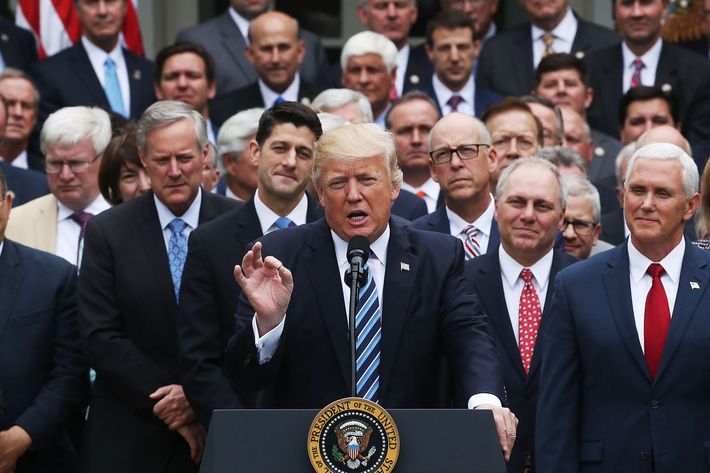This Won’t End Well for House Republicans

Nancy Pelosi once said that Congress had to pass the Affordable Care Act in order to find out what was in it. Republican demagogues pretended Pelosi was confessing to having hidden the details of her bill until its passage, but, as anybody who read the context of her remarks could see, that is not what she meant. Pelosi was dismissing the bill’s bad polling as an artifact of public ignorance. The law’s individual provisions were highly popular, and she believed the law, once functioning, would gain public support, because it would help far more people than it harmed.
But what is Paul Ryan’s theory? The American Health Care Act polls much, much worse than the Affordable Care Act ever did. It was under 20 percent before it collapsed in March. Republican leaders have since altered it by allowing states to remove protections for patients who have preexisting conditions — which is to say, they have added a politically radioactive feature to an already-unpopular bill. Republicans have no reason to believe the public will warm to the individual components of their bill. Its largest feature is financing a tax cut for wealthy investors, which is unpopular, with Medicaid cuts, which are also unpopular. It is stuffed with unpopular ancillary provisions that have so far barely featured in the broader debate — cuts to special education, elimination of funding for Planned Parenthood, threats to coverage for people who have employer-sponsored insurance, a much larger group than those covered directly by Obamacare. The Affordable Care Act changed a status quo that Americans disliked and wanted to change; the American Health Care Act repeals a law that — fulfilling Pelosi’s prediction, at long last — is popular.
Watch Paul Ryan make an argument in 2009 that should have convinced him to vote against Trumpcare.
Just how the party managed to cobble together a majority is, in a mechanical sense, an impressive feat. The party caucus appeared hopelessly divided between arch-conservatives, who opposed the law because it failed to take away enough coverage subsidies, and endangered members, who opposed it for taking away too much. Republican leaders broke the deadlock with ambiguity. They agreed to state-level waivers, which they told some members would mean a lot, and others would mean a little. They held the vote quickly, before constituents or the entire health-care industry, which was uniform in its opposition, could weigh in. They overcame their members’ built-in survival instincts with a rush of locker room psych-up tactics — the Rocky theme song and quotes from Patton.
Yet the Republican majority never solved the fundamental dilemma that for eight years has prevented it from crafting a workable health-care alternative. Their proposal creates relatively few winners and many losers. Wealthy investors would enjoy lower taxes, and young healthy individuals could have lower premiums, but a far larger number of Americans would suffer the much greater harm of losing insurance altogether.
Yes, Republicans did promise to repeal Obamacare. The only hypothesis I have seen for how this bill will help Republicans politically lies in the importance of promise-keeping. But Republicans also promised to replace Obamacare with something terrific. GOP leaders relentlessly pledged that their replacement would reduce premiums and deductibles. According to studies of the last version of their bill, premiums in the individual market are projected to increase by 13 percent, and deductibles would rise by 60 percent. President Trump repeatedly vowed not to cut Medicaid, and has smashed that promise.
The best outcomes for House Republicans remain the prospects that the Senate will either kill their bill, or else morph it into a bipartisan compromise that fixes Obamacare rather than repeals it. If anything resembling the bill they have just passed is ever signed into law, it would amount to one of the greatest self-inflicted political wounds in American history.
No comments:
Post a Comment